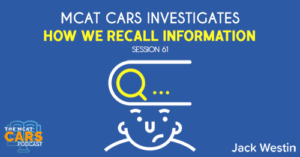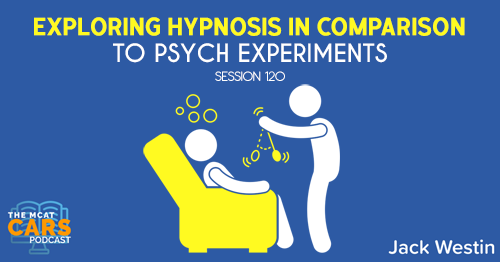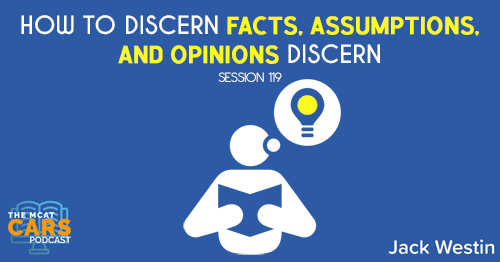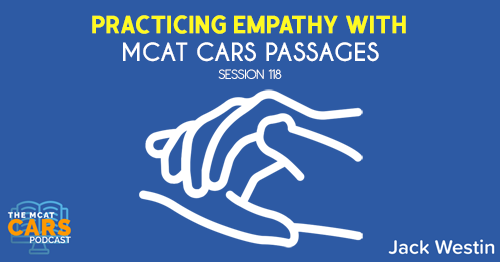Apple Podcasts | Google Podcasts

Session 61
What’s the best way to review and retain information? We’ll cover this, plus a practice passage delving into the same topic as our discussion! Today’s passage resonates with a lot of students studying for CARS.
Jack Westin joins us again for another interesting episode. Get free help and check out their free daily MCAT CARS passage.
Listen to this podcast episode with the player above, or keep reading for the highlights and takeaway points.
Link to article:
https://www.theatlantic.com/science/archive/2018/01/what-was-this-article-about-again/551603/
Pamela Paul’s memories of reading are less about words and more about the experience. “I almost always remember where I was and I remember the book itself. I remember the physical object,” says Paul, the editor of The New York Times Book Review, who reads, it is fair to say, a lot of books. “I remember the edition; I remember the cover; I usually remember where I bought it, or who gave it to me. What I don’t remember—and it’s terrible—is everything else.”
For example, Paul told me she recently finished reading Walter Isaacson’s biography of Benjamin Franklin. “While I read that book, I knew not everything there was to know about Ben Franklin, but much of it, and I knew the general timeline of the American revolution,” she says. “Right now, two days later, I probably could not give you the timeline of the American revolution.”
Surely some people can read a book or watch a movie once and retain the plot perfectly. But for many, the experience of consuming culture is like filling up a bathtub, soaking in it, and then watching the water run down the drain. It might leave a film in the tub, but the rest is gone.
“Memory generally has a very intrinsic limitation,” says Faria Sana, an assistant professor of psychology at Athabasca University, in Canada. “It’s essentially a bottleneck.”
The “forgetting curve,” as it’s called, is steepest during the first 24 hours after you learn something. Exactly how much you forget, percentage-wise, varies, but unless you review the material, much of it slips down the drain after the first day, with more to follow in the days after, leaving you with a fraction of what you took in.
Presumably, memory has always been like this. But Jared Horvath, a research fellow at the University of Melbourne, says that the way people now consume information and entertainment has changed what type of memory we value—and it’s not the kind that helps you hold onto the plot of a movie you saw six months ago.
In the internet age, recall memory—the ability to spontaneously call information up in your mind—has become less necessary. It’s still good for bar trivia, or remembering your to-do list, but largely, Horvath says, what’s called recognition memory is more important. “So long as you know where that information is at and how to access it, then you don’t really need to recall it,” he says.
[02:50] More Test-Taking Tips from Jack Westin
Jack thinks a lot of students worry more than actually study. Instead, study and do a couple of questions. The MCAT is difficult and studying for the MCAT could actually ruin your life but you can’t let that happen.
You can’t let the fear and worry get to you and make your standard of living worse. Challenge yourself instead to work hard and be efficient. Study so you won’t have to worry about it. Go back to your books and just do your job.
'If you feel you're worried about the test, just go study.'Click To Tweet[04:55] Paragraph 1, Sentence 1
Pamela Paul’s memories of reading are less about words and more about the experience.
Jack says:
We still don’t really know anything about it at this point. Just keep reading to see where the author is going with this.
[05:30] Paragraph 1, Sentence 2
“I almost always remember where I was and I remember the book itself.
Jack says:
Pamela remembers the act of reading. This resonates with probably every student studying for CARS. They remember the sweat on their hands and the fear without really focusing on the words.
[06:12] Paragraph 1, Sentence 3
I remember the physical object,” says Paul, the editor of The New York Times Book Review, who reads, it is fair to say, a lot of books.
Jack says:
Pamela Paul turns out to be the editor of the New York Times book review. She remembers the physical object, where she was, and the book itself.
[06:41] Paragraph 1, Sentence 4
“I remember the edition; I remember the cover; I usually remember where I bought it, or who gave it to me.
Jack says:
She’s reflecting on everything she remembers surrounding the book itself.
[07:00] Paragraph 1, Sentence 5
What I don’t remember—and it’s terrible—is everything else.”
Jack says:
Everything else here could it mean the book itself and what it says. The big picture here is that Pamela Paul remembers the experience and everything surrounding the book, but not necessarily the book.
[07:37] Paragraph 2, Sentence 1
For example, Paul told me she recently finished reading Walter Isaacson’s biography of Benjamin Franklin.
Jack says:
The author is giving an example.
[07:55] Paragraph 2, Sentence 2
“While I read that book, I knew not everything there was to know about Ben Franklin, but much of it, and I knew the general timeline of the American revolution,” she says.
Jack says:
She’s reading the book and knows she didn’t know everything but she knew a lot of it.
[08:15] Paragraph 2, Sentence 3
“Right now, two days later, I probably could not give you the timeline of the American revolution.”
Jack says:
This is an illustration of how the content doesn’t register after a while. She’s reading a lot of books and that’s the problem.
This is something a lot of students could feel as well. But you don’t have to remember the passage two days later. You’re going to read the passage and you’re answering it immediately. So there’s no excuse. You can remember what you’re reading.
Then you feel you don’t remember what you’re reading by the time you get to the end of the paragraph. And it’s probably because you don’t understand what you’re reading.
This is a matter of going slower and absorbing what you’re reading. Don’t pretend. If you fall in the habit of rereading because you just read too quickly, slow down a bit.
'Make sure you're paying attention the first time around so you don't have to go back and read it again.'Click To Tweet[09:50] Paragraph 3, Sentence 1
Surely some people can read a book or watch a movie once and retain the plot perfectly.
Jack says:
The author is setting up that other people can remember stuff better.
[10:00] Paragraph 3, Sentences 2-3
But for many, the experience of consuming culture is like filling up a bathtub, soaking in it, and then watching the water run down the drain. It might leave a film in the tub, but the rest is gone.
Jack says:
The author is setting up the opposite experience here.
[10:25] Paragraph 4, Sentence 1
“Memory generally has a very intrinsic limitation,” says Faria Sana, an assistant professor of psychology at Athabasca University, in Canada.
Jack says:
The author is bringing up an expert saying that we have limitations in memory.
[10:47] Paragraph 4, Sentence 2
“It’s essentially a bottleneck.”
Jack says:
The author is saying that Pamela’s experience isn’t just unique to her. We just don’t have the best memory for this kind of stuff. And the author even backs this up with an authority.
[11:12] Paragraph 5, Sentence 1
The “forgetting curve,” as it’s called, is steepest during the first 24 hours after you learn something.
Jack says:
Apparently, there’s a name for this thing and it’s the first 24 hours.
[11:30] Paragraph 5, Sentence 2
Exactly how much you forget, percentage-wise, varies, but unless you review the material, much of it slips down the drain after the first day, with more to follow in the days after, leaving you with a fraction of what you took in.
Jack says:
Students generally want to refresh the material in their minds sooner. But there’s just so much info on the MCAT.
How do learn all these concepts within four months? The best possible way is to do a question.
When you do questions, you’re more actively participating in the learning process. You’re engaging with the concept so you’re more likely to remember it. You’re going to have a stronger understanding of it. And you’re less likely to forget.
'When you do questions, you're more actively participating in the learning process.'Click To TweetHowever, if all you do is read content books. That’s not MCAT studying. It’s just reviewing. Studying is getting your hands dirty and working hard. You’re making your brain work. Do that and you’re less likely to forget.
Most importantly, take time to review those questions. Review even if you got it right to make sure you got right for the right reason.
[13:13] Paragraph 6, Sentence 1
Presumably, memory has always been like this.
Jack says:
The author is saying this is just the way our brains work.
[13:20] Paragraph 6, Sentence 2
But Jared Horvath, a research fellow at the University of Melbourne, says that the way people now consume information and entertainment has changed what type of memory we value—and it’s not the kind that helps you hold onto the plot of a movie you saw six months ago.
Jack says:
He’s saying that we have changed the things we value. The type of memory we value has changed.
[14:05] Paragraph 7, Sentence 1
In the internet age, recall memory—the ability to spontaneously call information up in your mind—has become less necessary.
Jack says:
This is basically the kind of memory that Pamela Paul had a problem with. The author is saying that this is the kind of memory that doesn’t really matter anymore.
[15:03] Paragraph 7, Sentence 2
It’s still good for bar trivia, or remembering your to-do list, but largely, Horvath says, what’s called recognition memory is more important.
Jack says:
There’s this other type of memory called recognition memory that we seem to value more.
[15:18] Paragraph 7, Sentence 3
“So long as you know where that information is at and how to access it, then you don’t really need to recall it,” he says.
Jack says:
Horvath is explaining why we don’t need our recall memory. Recognition is information about where it came from and how to access it. Just know the difference between recall and recognition and you’re going to be fine.
[16:09] The Main Idea
The passage is suggesting that it’s harder to remember cultural objects. The fact we don’t value that kind of memory makes it harder for us to do because we’re not doing it as much.
“Make sure you don't blame yourself if you forget something.”Click To TweetLastly, don’t be too hard on yourself if you forget something. Maybe it’s the way we’re perceiving these things. Again, work had and practice doing a lot of questions to remember stuff.
Links:
Jack Westin (free daily MCAT CARS passage)
Link to article:
https://www.theatlantic.com/science/archive/2018/01/what-was-this-article-about-again/551603/
SEARCH SITE
SEARCH SITE
LISTEN FOR FREE











